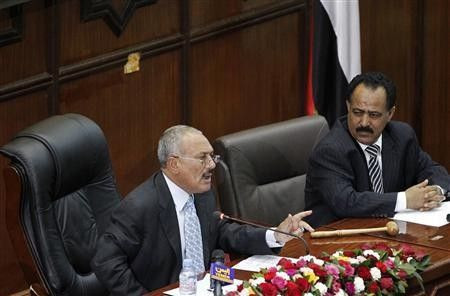Yemen president signals won't stay beyond 2013

Yemeni President Ali Abdullah Saleh, eying protests that threaten to topple Egypt's long-time ruler, indicated on Wednesday he would leave office when his current term ends in 2013, after three decades in power.
Saleh, a key U.S. ally against al Qaeda, also vowed not to pass on the reins of government to his son and appealed to the opposition to call off protests as a large rally loomed.
I present these concessions in the interest of the country. The interests of the country come before our personal interests, Saleh told parliament and members of the military.
No extension, no inheritance, no resetting the clock, he said, making reference to ruling party proposals on term limits that had been seen as designed to enable him to run again.
The move was Saleh's boldest gambit yet to stave off anti-government turmoil spreading in the Arab world as he tried to avert any showdown with the opposition that could risk drawing people into the streets in deeply impoverished Yemen.
Saleh's remarks came a day before a planned large opposition rally, dubbed a Day of Rage, seen as a barometer of the size and strength of the Yemeni people's will to follow Egyptians and Tunisians in demanding a change of government.
I call on the opposition to freeze all planned protests, rallies and sit-ins, Saleh said. I call on the opposition after this initiative to come and form a national unity government in spite of the ruling party majority. We will not allow chaos. We will not allow destruction.
About 5,000 government supporters held a rally in a sport stadium in a suburb of the capital Sanaa on Wednesday, some carrying signs that read No to sabotage, yes to security and stability and Yes to unity, no to separatism.
Yemen, in risk of becoming a failed state, is trying to fight a resurgent al Qaeda wing, quell southern separatism, cement peace with Shi'ite rebels in the north, all in the face of crushing poverty. One third of Yemenis face chronic hunger.
I think it is very significant, Dubai-based security analyst Theodore Karasik said of the move. What they are doing in Yemen is trying to not have what happened in Egypt.
I don't know if it will be enough to satisfy people. It may try to heal some of the cleavages between for example the southern secessionist movement and Sanaa, but is it going to be enough for everyone?
The United States leans heavily on Saleh to help combat al Qaeda's regional Yemen-based arm that also targets neighbouring top oil exporter Saudi Arabia. More instability could mean significant political and security risk for the Gulf region.
RALLY TO GO ON
Yemen's biggest opposition party welcomed the initiative but said Thursday's rally in the capital Sanaa would still go ahead. The rally's size and mood will offer the first glimpse of popular reaction to Saleh's concessions.
We consider this initiative positive and we await the next concrete steps. As for our plan for a rally tomorrow, the plan stands and it will be organised and orderly, said Mohammed al-Saadi, undersecretary of the Islamist party Islah (reform).
This is a peaceful struggle through which the people can make their voices heard and express their aspirations.
Saleh had already offered lesser concessions on presidential term limits and pledged to raise civil servants' and military salaries by around $47 (29.06 pounds) a month, no small move in a country where about 40 percent of the population lives on less than $2 a day.
However, the pledges on Wednesday went much further.
Saleh promised to delay parliamentary elections due in April to conduct reforms to bring the opposition on board by persuading them the vote will be fair. The delay was not expected to last more than several months.
He also pledged to re-open voter registration in an apparent response to opposition complaints that around 1.5 million Yemenis had been unable to sign up. Saleh also renewed an offer for a unity government with the opposition.
Saleh also promised direct election of provincial and local governors, which would give Yemenis more say over local affairs, and put on hold all proposed constitutional changes, including on presidential term limits, pending talks with the opposition.
The current constitution would require Saleh to step down when his term ends in 2013, and opposition had feared the constitution would be amended to extend the time he could spend in office, as was done in 2004.
Members of Saleh's ruling party had riled the opposition in recent months with proposals for constitutional amendments to either lift the 2013 limit or impose fresh term limits of two terms of five to seven years but allow Saleh to run again.
The opposition tried to rally against lifting term limits in December, but failed to bring large numbers to the street. Last week, however, a protest drew around 16,000 people to demand a change of government. Some called for Saleh to leave.
© Copyright Thomson Reuters 2024. All rights reserved.





















